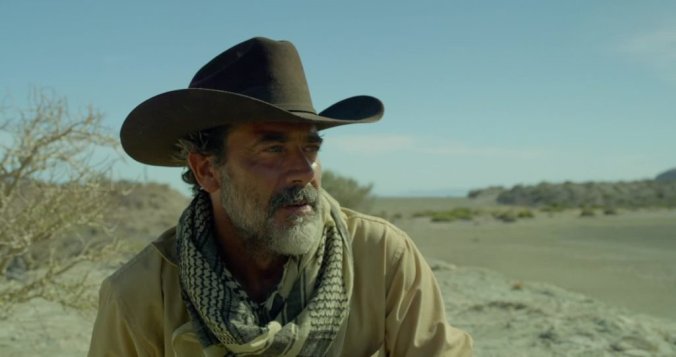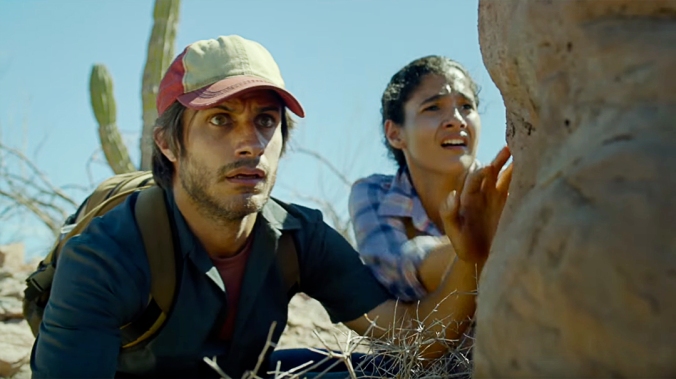
Mexico | Thriller, Drama | Directed by Jonás Cuarón | Starring: Gael García Bernal, Jeffrey Dean Morgan, Alondra Hidalgo, Diego Cataño, Marco Pérez
It could never have been predicted by writer-director Jonás Cuarón when he started work on Desierto years ago, but only three days after Donald Trump shockingly won the United States presidency, this could not have been a more opportune moment for the audience at Bath Film Festival 2016 to watch a racist vigilante gun down a group of helpless Mexicans trying to cross the US border.
There are all kinds of social implications that you can place on this film, especially with immigration being such a significant issue in the United States and around the world at the moment. Yet above all, I think Cuarón wants Desierto to be watched and enjoyed as a nail-biting cat-and-mouse thriller that will keep audiences on the edge of the seats for an hour and a half. After all, there is very little dialogue that calls attention to any wider issues, most of the characters are preoccupied with staying alive and there simply isn’t time for a monologue or discussion about the difficulties that Mexicans face in far-right America.

The Mexican-American conflict simply offers an effective backdrop for a real-life horror story and the film itself doesn’t need any spelled-out social commentary to justify its motives. However, the film would have benefitted from a little more character construction in the first act. We are naturally aligned with the Mexican immigrants, but as soon as the action kicks off, we still don’t really know who these people are, what they’re relationships are with each other, why they are immigrating and what is at stake (apart from their lives of course). Therefore as each one if picked off by the sniper, it doesn’t hit as hard as it could, because we simply are not emotionally invested yet.
As humans we are sympathetic nonetheless, and as the immigrants scatter across the vast open desert in search of nonexistent cover from the hunter’s aim, we heart-wrenchingly wait for the next victim to be struck down by another decisive shot. For the hunter, it is like shooting a fish in a barrel, as the immigrants have both everywhere and nowhere to run. The events play out fairly predictably, following the format of the thrillers we are used to, like Alien or Predator, where the character pool is slowly whittled down one by one, leading towards a final showdown between our most durable protagonist and the all-powerful enemy.

Gael García Bernal is the closest thing the audience has to a heroic character whose shoes they can jump into. We know that he has a family waiting for him in the States and it is clear that he is going to do whatever it takes to join them; but even he makes some contentious decisions in this frantic and relentless environment. With every move, you find yourself questioning – what would I do to get out of this seemingly hopeless situation? You’re reminded that these characters are just your average everyday people, none of whom are skilled in the act of survival or war. It’s a situation in which people are forced to show their true colours, and only the most cunning, fit and ruthless will be able survive. Desierto hints at some of these ideas but fails to follow through with them. Somewhere in here, there is a better film that could have been made, one with greater character development and story and consequentially greater meaning and purpose.

Jeffrey Dean Morgan’s diabolical hunter is really the only character written with any colour – albeit monstrous colour. Morgan, who has had a sudden rise to fame as the brilliantly villainous Neagan in The Walking Dead, has to be careful he doesn’t fall into the murderous psychopath typecast, as he gives another terrifying yet humorous turn as the twisted antagonist here. Yet unlike the Walking Dead dictator, this character is more of a mad loner who seems to have been completely derailed by his incessant xenophobic urge to wipe out all non-Americans.
The hunter’s behaviour is obviously deplorable, but he is undoubtedly the most exciting character to watch and he has quite an amusing marital relationship with his pet dog, presented in stark contrast to the way he feels about the only other humans in the film. He exhibits a complete lack of empathy and hunts these defenceless immigrants as he would rabbits or deer; as if it’s another casual day at the office. We only ever witness the discourse between the hunter and his dog, so we never learn much more about this character, other than that he’s just an evil racist. We don’t know why his hatred has spiralled so far out of control, but maybe it’s this mystery and his blasé attitude that make him so scary. It is these kinds of psychopaths that are truly formidable in film, as the audience immediately knows that this character has no limits to how much damage they can deliver and it is clear that they will never be reasoned with.

Cuarón does well to present the desert as being the ultimate force to be reckoned with. Unlike similar thrillers that usually take place in claustrophobic settings, where there is no escape for the victims, in Desierto, the immigrants have miles of desert to run off into, but if they are injured in anyway or get separated from the group they will be claimed by the desert itself. This idea comes to the fore when the remaining Mexicans decide that the only way to escape the desert in one piece is to bring down their pursuer and fight back. When the hunter and the hunted begin to reach level pegging, the battle becomes even more primal and the use of natural surroundings comes into play. As the cat-and-mouse chase reaches it’s climax, the desert becomes the true decider of who lives and who dies.
